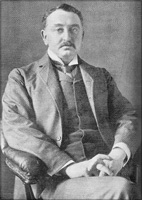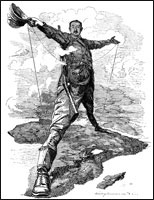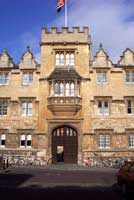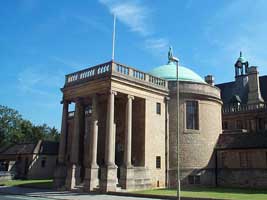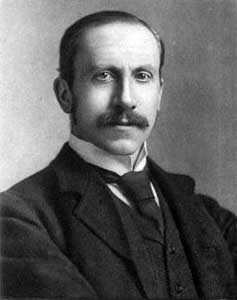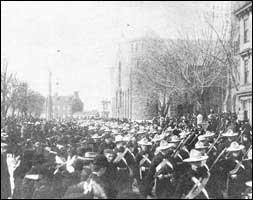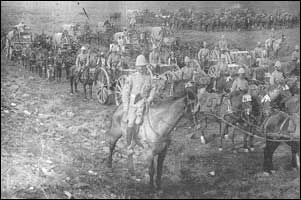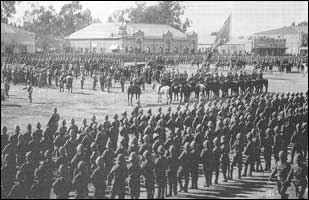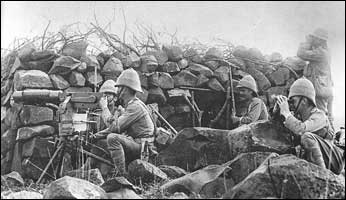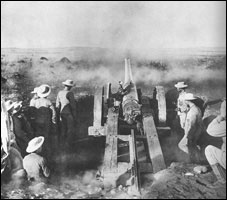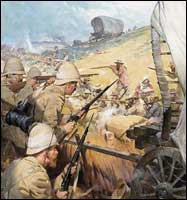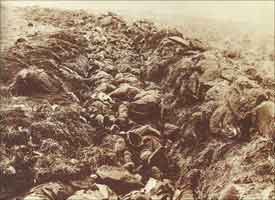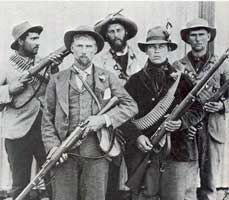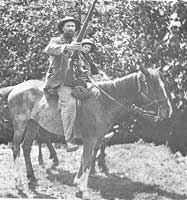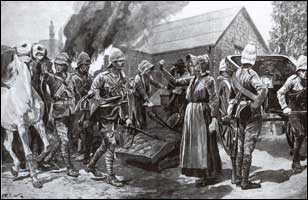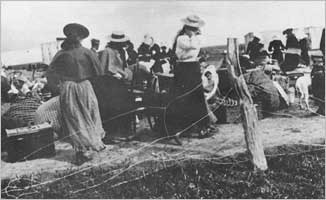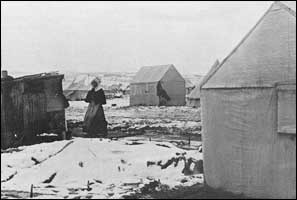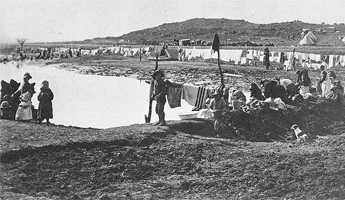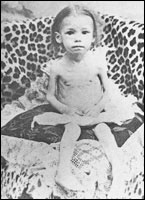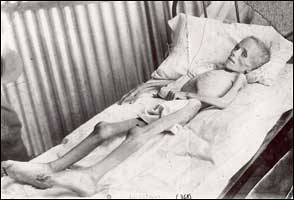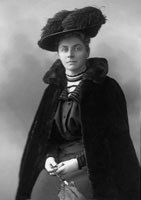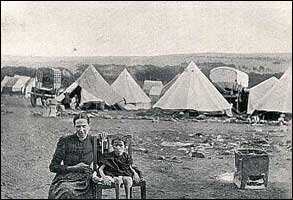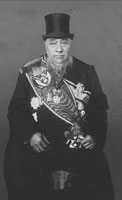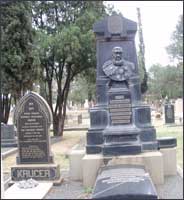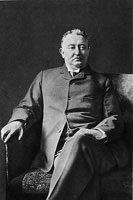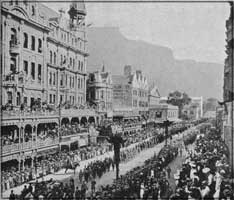THE GOLD STOLEN FROM SOUTH AFRICA DURING THE BOER WAR OR GOLD WAR FINANCED
IMPERIAL GERMANY'S SECOND REICH TITANIC MILITARY BUILDUP!! |
The Boer War or the Gold War was the first war of the bloody 20th century. It pitted the might of the British Empire against a small group of Dutch farmers. Boer is simply the Dutch word for FARMER.
Diamonds were discovered in South Africa in 1867 and gold in 1872. By 1897 South Africa was the world's largest exporter of gold.
The golden rule states that "whoever has the gold; makes the rules." The Boer War was all about the Bank of England gaining a complete monopoly on South African gold. In the 16th century, the brutal Spanish Empire committed a similar genocide to gain a monopoly on New World gold....Only Heroic Holland stood in the way of Spanish global hegemony.
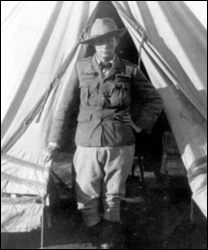 The real tall Churchill (1874–1900) outside his tent in South Africa. |
|
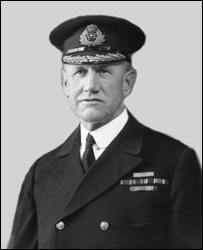 Captain Bertram Fox Hayes (1864–1941). |
They certainly succeeded in making a "war hero" of Winston Churchill, but he was not the Winston Churchill who left his bones with the brave Christian Boers in South Africa!
The Gold War was a replay of the Spanish-American War that began with the sinking of the Maine. Coincidently, Churchill visited Cuba as a "war correspondent" in 1895. That conflict made a "war hero" of plastic man Teddy Roosevelt, who went on to become President by assassinating President McKinley.
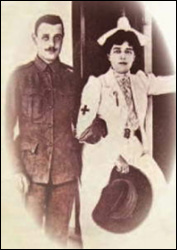 Jack and Jennie Churchill on the hospital ship Maine in South Africa. |
|
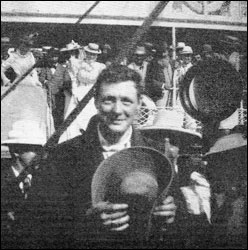 A fake Churchill after his "great escape" in Durban, South Africa. |
Cecil Rhodes was the Bank of England's liaison in South Africa and his De Beers Mining Company already had a complete monopoly on the diamond output of the Kimberley mine. The stolen gold from South Africa was used by the Bank of England to finance World War I and World War II.
|
Rhodes attended Oriel College, Oxford, in 1873. Oriel College is 7 times more Papal than the Vatican . . . and has produced some of the most bigoted persecutors of true Christians since the time of Emperor Nero.
|
Some infamous graduates include Thomas Arundel, Sir Thomas More, Cardinal Allen, Cardinal Newman etc., etc.
In his last will and testament, Rhodes established a scholarship fund with the stolen South African gold. It is called the Rhodes Scholarship and is open to Commonwealth members, Germans, and U.S. citizens. Rhodes was so committed to making the U.S. a part of the British Empire that he dedicated a large part of the stolen gold to that vital objective.
The Russians–the most intelligent people in the world–are definitely not eligible for Rhodes Scholarships.
Some famous Rhodes "donkey scholars" include ex-President Bill Clinton, ex-Arkansas senator J. William Fulbright, and former NATO head Wesley Clark.
The British Empire mobilized 500,000 men to fight the farmers!
The British mobilized a vast army to fight the Dutch farmers. General Kitchener was their most experienced soldier. The British wholly underestimated the Boers and they believed that just the sight of the British Army would make them run.
|
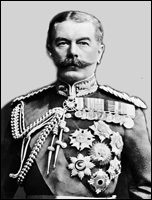 General Kitchener "Attila the Hun" (1850–1916). |
Men came from as far away as Australia and New Zealand to "serve their Queen" who was too old to even know or care what was happening in her Empire.
|
Troop strength finally reached a total of 500,000 men from all parts of the British Empire.
|
This vast army used state of the art military technology. One such weapon was the newly invented Maxim machine gun.
|
Despite the overwhelming numbers and the latest killing technology, the Boers fought heroically against the British invaders.
The Christian farmers fought heroically against Kitchener's Huns!!
The Boers were never able to field more that 60,000 men but they fought heroically to defend their homeland.
|
The real heroes of the resistance were the individual Boers who displayed remarkable courage and resourcefulness.
|
With the cream of the British Army turned into whipped cream, General Kitchener resorted to a diabolical scorched earth policy.
The South African Attila the Hun erected concentration camps for women and children!!
Despite signing the Hague Convention, the British resorted to a scorched earth policy in order to subdue the Boers. Homes were burned to the ground, cattle were slaughtered, and the women and children carted off to concentration camps.
|
In the unkindest cut of all, the women were asked to sign a piece of paper pleading with their husbands to surrender. Despite terrible suffering, not one woman relented and signed the paper.
|
Boer children died by the thousands from dysentery, typhoid, and malnutrition.
|
By 1900, true Christianity was not completely extinct in Britain. In December 1899, an angel of mercy named Emily Hobhouse arrived in South Africa on a mission of mercy.
|
After Emily arrived in South Africa, she sought permission from Lord Kitchener to visit the camps. Kitchener rebuked her sternly so she turned to the governor, Lord Milner.
Milner was more cooperative and the first camp she visited was named Bloemfontein. Here is her eyewitness report of conditions in the camp:
My first visit to the camp at Bloemfontein after the lapse of a few weeks was a great shock. The population had doubled, and had swamped the effect of improvements which could not keep pace with the numbers to be accommodated. Sickness was increasing, and the aspect of the people was forlorn in the extreme. Disease and death were stamped upon their faces. Many whom I had left hale and hearty, full in figure and face, had undergone such a change that I could not recognise them. I realised how camp life under these imperfect conditions was telling upon them, and no impartial observer could have failed to see what must ensue, unless nurses, doctors, workers, and above all extra food, clothing, and bedding, could be poured out in abundance and without delay. I sought the Deputy Administrator, and represented to him the death-rate already worked out in the adjoining camp at 20 per cent., and asked if nothing could be done to stop the influx of people. He replied that he believed that all the people in the entire country, with the exception of towns on the line, were to be brought in. His kindness and courtesy often encouraged me to put before him not only the bodily needs of the women, but other troubles or punishments which weighed upon them, which seemed unnecessarily severe, and appeared to be creating sores which even time would not have power to heal. His policy was no doubt dictated from higher sources, his humanity too evidently crippled by lack of means. My fund was but a drop in the ocean of such a need. (Hobhouse, The Brunt of the War and Where it Fell, pp. 122-123).
Emily discovered that a total of 45 concentration camps existed throughout South Africa; most of them with the same appalling conditions as Bloemfontein.
This war was a public relations nightmare for the British, so to deflect criticism of their brutal behavior, they invented a "Jewish" holocaust with "Jewish" concentration camp inmates.
All nations feared to help the beleaguered Boers!!
Apart from a small group of volunteers from the U.S., France, and Holland, no nation offered any military help to the Boers. Boer president Paul Kruger traveled to Europe in 1900 but all he received from the Europeans was sympathy.
Paul Kruger appealed to the German Kaiser for help but the Kaiser could render them no assistance because he had no navy.
|
President Kruger traveled to Europe in 1900 seeking military help for his farmers. No nation offered him any assistance and the German Kaiser refused to even meet with him:
Where did the Kaiser get the money to build a vast fleet and challenge the British Empire in 1914? Obviously, it was a gift of some of the stolen South African gold courtesy of the Bank of England!!But Leyds was not really surprised. Britain had largely ignored the French demonstrations, but a similar sort of thing in Germany would be a different matter. Instead of helping the Boers, and to make up for past indiscretions, the Kaiser in fact sent suggestions to England as to how the Boers could be vanquished by a scorched earth policy, concentration camps, drives, and so on, measures actually adopted by Lord Kitchener who succeeded Lord Roberts. To his critics the Kaiser explained that he was in no position to go to war with England because he did not have a proper fleet, so it was best to befriend her. Leyds did not know all this, but he had hoped that Kruger's actual arrival would clarify the situation. Now it had been clarified, and he called off a German tour. (Meintjes, President Paul Kruger, p. 254).
The Rhodes blueprint for British worldwide hegemony!!
Rhodes died and went to meet his Maker just as the war was ending. A British colony in Africa was named after him called Rhodesia but the name was changed to Zimbabwe in 1965.
|
Rhodes was extremely xenophobic and he believed that all of Africa should be part of the British Empire. He believed that all other races (especially blacks) were inferior.
He was very, very anxious to see the U.S. Republic destroyed and annexed to the British Crown:
The idea gleaming and dancing before ones eyes like a will-of the-wisp at last frames itself into a plan. Why should we not form a secret society with but one object the furtherance of the British Empire and the bringing of the whole uncivilised world under British rule for the recovery of the United States for the making the Anglo-Saxon race but one Empire. What a dream, but yet it is probable, it is possible. I once heard it argued by a fellow in my own college, I am sorry to own it by an Englishman, that it was a good thing for us that we have lost the United States. There are some subjects on which there can be no arguments, and to an Englishman this is one of them, but even from an American's point of view just picture what they have lost, look at their government, are not the frauds that yearly come before the public view a disgrace to any country and especially their's which is the finest in the world. Would they have occurred had they remained under English rule great as they have become how infinitely greater they would have been with the softening and elevating influences of English rule, think of those countless 000's of Englishmen that during the last 100 years would have crossed the Atlantic and settled and populated the United States. Would they have not made without any prejudice a finer country of it than the low class Irish and German emigrants? All this we have lost and that country loses owing to whom? Owing to two or three ignorant pig-headed statesmen of the last century, at their door lies the blame. (Rhodes, "Confession of Faith").
What his Jesuit "educators" failed to tell him was that the British tried to destroy the United States twice: The first time during the War of 1812, and the second time during the U.S. Civil War.
Most sane people would dismiss Rhodes and his demoted raving if it wasn't for the vast amount of stolen gold that ended up in the Bank of England.
As there is a counterfeit "Christianity" with headquarters at Vatican City, the City of London, and Oriel College, Oxford, that just proves that real Christianity exists because nobody can counterfeit something that has no existence.
The Holy Bible, correctly translated, is the Christians' sharp sword....That divine Word promises complete victory over Gog and Magog . . . and over ALL the power of the enemy. The Messiah gave his followers 2 precious promises:
When the enemy shall come in like a flood, the Spirit of JEHOVAH shall lift up a standard against him. (Isaiah 59:19).
No weapon that is formed against thee shall prosper; and every tongue that shall rise against thee in judgment thou shalt condemn. This is the heritage of the servants of JEHOVAH, and their righteousness is of me, saith JEHOVAH. (Isaiah 54:17).
Vital Links
References
Flint, John. Cecil Rhodes. Little, Brown and Company, Boston, 1974.
Hobhouse, Emily. The Brunt of the War and Where it Fell. Methuen & Co., London, 1902.
Lee, Emanoel, To the Bitter End. Penguin Books, London, England, 1985.
Meredith, Martin, Diamonds, Gold, and War. The British, the Boers, And the Making of South Africa. Public Affairs, New York, 2007.
Meintjes, Johannes, President Paul Kruger. A biography. Cassel, London, 1974.
Pakenham, Thomas, The Boer War. Random House, New York, 1979.
Rothberg, Robert I. The Founder: Cecil Rhodes and the Pursuit ofs Power. Oxford University Press, Oxford and New York, 1988.
Stead, W.T. The Last Will and Testament of Cecil John Rhodes. "Review of Reviews" Office, London, 1902.
